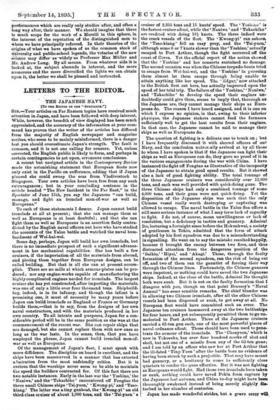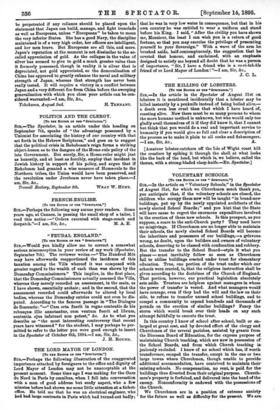LETTERS TO THE EDITOR.
THE JAPANESE NAVY.
[To THE EDITOR OF THE "SPECTATOR."]
Sin,---Your articles on Far Eastern topics have received much attention in Japan, and have been followed with deep interest. While, however, the breadth of view displayed has been much appreciated, and the accuracy of the information at your com- mand has proven that the writer of the articles has differed from the majority of English newspaper and magazine scribes, who seem to be mainly misinformed, there is a danger lest you should overestimate Japan's strength. The fault is common, and it is not one calling for censure. Yet, unless corrected, the English public is likely to form, and perhaps in certain contingencies to act upon, erroneous conclusions.
A recent but unsigned article in the Contemporary Review made the astonishing statement that European fleets now only exist in the Pacific on sufferance, adding that if Japan pleased she could sweep the seas from Vladivostock to Singapore. Your own articles have been free from any such extravagances ; but in your concluding sentence in the article headed "The New Incident in the Far East," in the Spectator of June 15th, you say the Japanese "can build, manage, and fight an ironclad man-of-war as well as Europeans."
To each of these statements I demur. Japan cannot build ironclads at all at present; that she can manage them as well as Europeans is at least doubtful ; and that she can fight them as well as Europeans is an assertion flatly contra- dicted by the English naval officers out here who have studied the accounts of the Yaloo battle and watched the naval bom- bardment of Wei-hai-wei.
Some day, perhaps, Japan will build her own ironclads, but there is no immediate prospect of such a significant advance- ment in her mechanical capabilities. She has built a few cruisers, if the importation of all the materials from abroad, and piecing them together from European designs, can be called building. But that is all she can at present accom- plish. There are no mills at which armour-plates can be pro- duced; nor any engine-works capable of manufacturing the highly complicated engines needed for ironclads. The largest cruiser she has yet constructed, after importing the materials, was one of only a little over four thousand tons. Shipbuild- ing, indeed, is in its infancy, and though the infant is a promising one, it must of necessity be many years before Japan can build ironclads as England or France or Germany builds them,—that is to say, from the designs of her own naval constructors, and with the materials produced in her own country. To all intents and purposes, Japan for a con- siderable period will be in the same position as she was at the commencement of the recent war. She can repair ships that are damaged, but she cannot replace them with new ones so long as the war lasts. In the sense, then, that you have employed the phrase, Japan cannot build ironclid men-of- war as well as Europeans.
Of the management of Japan's fleet, I must speak with more diffidence. The discipline on board is excellent, and the ships have been manceuvred in a manner that has extorted admiration from the most unfriendly critics. But it is curious that the warships never seem to be able to maintain the speed the builders contracted for. Of this fact there are two notable instances. Early in the last war the ' Yoshino,' the 4 Naniwa,' and the 'Takachiho ' encountered off Fengtao the three small Chinese ships ITsi-yuen," Kwong-yi,' and Tsao- kiang! The latter was a tiny gunboat, the Kwong-yi ' an old third-class cruiser of about 1,000 tons, and the' Tsiquen a
cruiser of 2,355 tons and 15 knots' speed. The 'Yoshino' is the fastest cruiser afloat, while the' Naniwa ' and Takachiho ' are credited with doing 181 knots. The three indeed were the crack vessels of the fleet. The ' ICwong-yi ' ran ashore, the ' Tsao-kiang ' fell an easy prey, and the Tsi-yuen,' although some 6 or 7 knots slower than the ' Yoshino,' actually escaped to Port Arthur, though the fight occurred off the coast of Corea. Yet the official report of the action showed that the 'Yoshino' and her consorts sustained no damage. The second occasion was when the Chinese torpedo-boats tried to escape from Wei-hai-wei, and the Yoshino' in pursuing them almost let them escape through being anable to attain anything like her speed. Tht lildgar,' now attached to the British fleet out here, has actually improved upon the speed of her trial trip. The failure of the Yoshino," Naniwa,' and urakachiho ' to develop the speed their engines un- doubtedly could give them, seems to imply that, thorough as the Japanese are, they cannot manage their ships as Euro- peans do. The reason I have heard assigned, and it is one on which I express no opinion, is that, owing to their inferior physique, the Japanese stokers cannot feed the furnaces sufficiently well to get the best results from their engines. In that case, the Japanese cannot be said to manage their ships as well as Europeans do.
The question of fighting is a delicate one to touch on ; but I have frequently discussed it with shrewd officers of our Navy, and the conclusion univer.ally arrived at by all those to whom I have spoken is that if the Japanese can fight their ships as well as Europeans can do, they gave no proof of it in the various engagements during the war with China. I have instanced the fight off Fengtao as illustrative of the incapacity of the Japanese to obtain good speed results. But it showed also a lack of good fighting ability. The total tonnage of the three Japanese cruisers was considerably over 12,000 tons, and each was well provided with quick-firing guns. The three Chinese ships had only a combined tonnage of some 4,000 tons, and their guns were not quick-firing. Yet the disposition of the Japanese ships was such that the only Chinese vessel really worth destroying or capturing was allowed to escape. The naval battle in the Yaloo Sea offers a still more serious instance of what I may term lack of capacity to fight. I do not, of course, mean unwillingness or lack of resolution, but a deficiency in tactics and gunnery. Admiral Ito, lecturing a fortnight since before the Hokunkwai, a society of gentlemen in Tokio, admitted that the form of attack adopted by his first squadron was due to a misunderstanding in signalling. He went on to say the mistake resulted happily, because it brought the enemy between two fires, and thus distracted attention from the dangerous position of the
Saikio," Hiyei,' and A.kagi: These, through the faulty formation of the second squadron, ran the risk of being cut off, and two of them ran the gauntlet of forcing their way through the Chinese lines. Fortunately, the Chinese gunners were impotent, or nothing could have saved the two Japanese ships. Indeed, at the close of the battle, Admiral Ito thought both were sunk. But it is not on the faulty formation that I disagree with you, though on that point Brassey's "Naval Annual" has some sensible remarks. The chief blunder was in allowing two Chinese ironclads, after all the other Chinese vessels had been dispersed or sunk, to get away at all. No European fleet would have committed such an error. The Japanese ten cruisers hammered away at the two battleships for four hours, and yet subsequently permitted them to go un- molested to Port Arthur. Three of the Japanese cruisers carried a 62-ton gun each, one of the most powerful pieces of naval ordnance afloat. Those should have been used to pene- trate the armour of the ironclads. The Chenyuen,' which is now in Yokosuka, has over four hundred marks of shot and shell, but not one of a missile from any of the 62-ton guns; and I am told by an officer who saw her at Port Arthur that the ill-fated Ting-Yuen' after the battle bore no evidence of having been struck by such a projectile. That may have meant bad gunnery, or a hesitancy to come to sufficiently close quarters to render the guns effective. But it was not fighting as Europeans would fight. Had those two ironclads been taken or sunk, nothing could have saved Pekin from capture by the Japanese last autumn, and China to-day might have been thoroughly awakened instead of being merely slightly dis- turbed in her slumber of centuries.
Japan has made wonderful strides, but a grave error win, be perpetrated if any reliance should be placed upon the statement that Japan can build, manage, and fight ironclads as well as Europeans, unless "Europeans" be taken to mean the very inferior States. She has a good Navy, the discipline maintained is of a very high order, her officers are intelligent, and her men brave. But Europeans are all this, and more. Japan's reputation at the moment is not dissimilar to the so- called appreciation of gold. As the collapse in the value cf silver has seemed to give to gold a much greater value than it formerly possessed, though in reality it is silver that is depreciated, not gold appreciated, so the demoralisation of China has appeared to greatly enhance the naval and military strength of Japan, whereas that strength has never been really tested. It will require a victory in a conflict between Japan and a very different foe from China before the sweeping generalisation with which you close your article can be con- sidered warranted.—I am, Sir, &c., Yokohama, August 2nd. H. TENNANT.



































 Previous page
Previous page